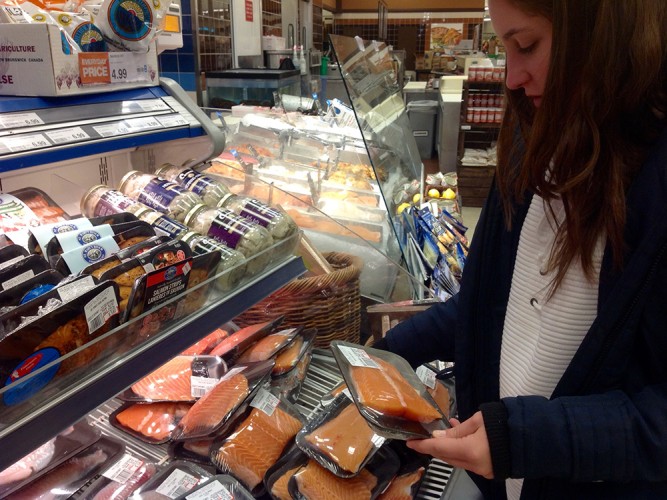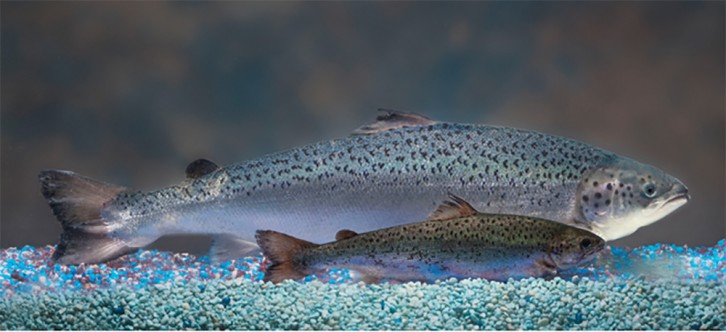News
Genetically modified salmon case before federal court this week
Ecology Action Centre and Living Oceans Society say the government did not follow its own rules

caption
Ecological groups worry that without sufficient public notice and adequate assessment, genetically-modified salmon could end up in Canadian supermarkets.
caption
Ecological groups worry genetically modified salmon could end up in Canadian supermarkets.Two ecological groups took Ottawa to court on Tuesday because they say Environment Canada’s decision to approve the commercial production of genetically modified salmon eggs for AquaBounty Canada Inc. is fishy.
The Ecology Action Centre (EAC) and Living Oceans Society disputed the decision-making process in Federal Court on Tuesday in hopes that AquaBounty’s application will be re-evaluated.
Karen Wristen of B.C.’s Living Oceans Society said the procedure was going on “behind a veil of secrecy that’s counter to law.”
“There were points in the approval process where the government was obliged by law to notify Canadians what it was doing and it did not do so,” said Wristen.
Scott McAnsh is a lawyer with Ecojustice, which represents the groups. He said the federal department violated parts of the Canadian Environmental Protection Act (CEPA) when it approved AquaBounty’s application to manufacture genetically modified salmon eggs at its P.E.I. facility in Nov. 2013.
“The government didn’t give any reasons for giving [commercial] permission,” said McAnsh, about the lack of public disclosure from the government. “It’s not something that was applied for nor reviewed by the scientific experts.”
The right to know
McAnsh says AquaBounty’s initial application to the Minister of the Environment included a request to omit information. He said the company asked not to provide one of the required provisions under the regulation – tests on invasiveness of the salmon.
“I’m not going to comment on that,” said Dave Conley, a spokesperson for AquaBounty.
The CEPA stated that “the Minister may waive any of the requirements to provide information if… the person requesting the waiver is able to contain the living organism so as to satisfactorily protect the environment and human health.”
Natalie Huneault, a spokesperson for Environment Canada, wrote in an email that “the Government of Canada conducted a thorough risk assessment of genetically-modified AquAdvantage salmon under the New Substances Notification Regulations.”
She explained that “this risk assessment concluded that there were no concerns identified to the environment or to the indirect health of Canadians due to the contained production of these GM fish eggs for export.”
Under the CEPA, public notices of decisions must be published in the Canada Gazette when exemptions are granted. McAnsh said Environment Canada neglected to publish the department’s decision to waive the requirement, failing to notify the public that an assessment was made using “basically incomplete information.”
Huneault said that because the case is still in progress, “it would be inappropriate to comment on the issue at this time.”
Scrambled eggs
The genetically modified eggs under fire belong to Atlantic salmon. After being injected with AquAdvantage construct – genes from chinook salmon and ocean pout – they hatch into fast-growing AquAdvantage salmon.

caption
AquaBounty claims that AquAdvantage salmon grow twice as fast as wild salmon.Mark Butler, policy coordinator of the EAC in Halifax, worries about the possible consequences should fish escape from their containers and breed with wild salmon.
“At some point something is going to happen,” said Butler. “Fish are going to escape and they are going to get into the local rivers and streams and one of these fish may prove to be fertile.”
“Once that happens,” he adds. “There’s no putting the genie back in the bottle.”
AquaBounty maintains that fish grown from the eggs are all female and sterile, despite arguments from ecological groups that up to five per cent of their fish may be able to reproduce.
“Our data has shown it’s 99.8 per cent,” said Conley about the sterility of AquAdvantage salmon. “The 95 per cent that’s often quoted, that is what the FDA provided as a guideline, but we went well beyond that.”
In regards to an escape, Conley said the likelihood of an AquAdvantage salmon ending up in the wild is zero.
“There are at least 20 physical barriers that fish would have to get through which is just not possible,” said Conley of the land-based systems where AquAdvantage salmon are grown. “We’ve been raising them now for 23 years and no escapes, no problems.”
“It’s happening in our backyard”
The EAC’s Butler said he felt personally responsible to get involved in the lawsuit regarding Atlantic salmon eggs because of the strong link Atlantic Canada has to the fish.
“Atlantic salmon is a really, really important species for us in so many ways culturally, economically, ecologically and it’s under threat,” he said.
Regardless of location, Living Oceans Society’s Wristen believes all Canadians should be concerned about the implications of approving genetically modified salmon eggs.
“It’s important to all Canadians because this is the world’s first genetically-modified food animal, and it’s being foisted on the public with absolutely no public discourse,” said Wristen.
Both groups are hoping the new Liberal government will take a different approach to the issue than the Conservatives, if ordered to revisit AquaBounty’s initial application.
“I’m hopeful that the court will share those arguments and rectify this approval and send it back to Trudeau’s ministers who are much more committed to openness and public discourse,” said Wristen.
Ecojustice lawyer McAnsh said the judge should announce his decision in four to six months.

